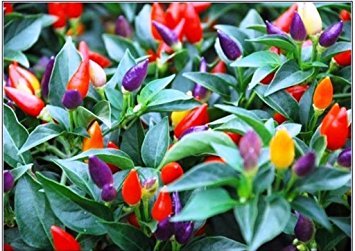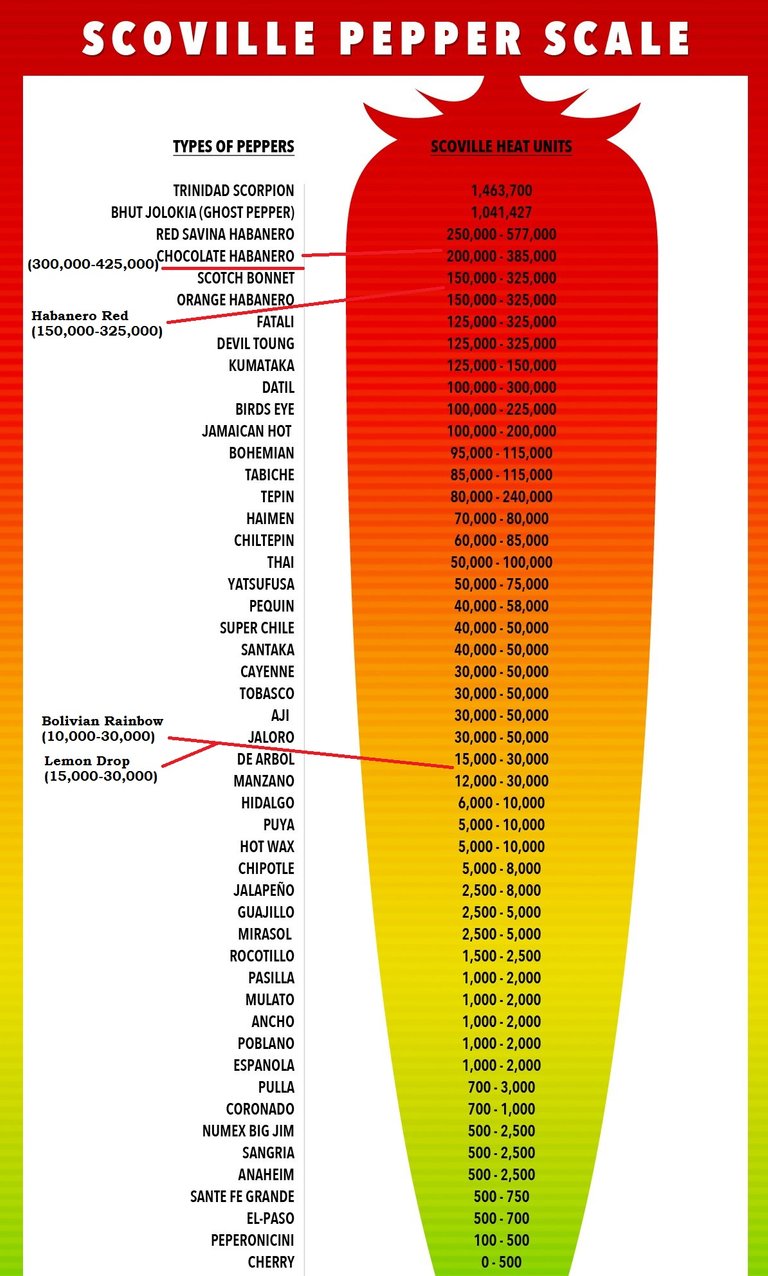Recently I wrote a short blog about me discovering this spicy plant. If you missed it - here is a link. As promised I will now tell you a little more about this topic.

For an introduction to spicy food, I must first tell you about "The Scoville scale". Some of you know what I am talking about, but for some of you, the expression is not familiar. The Scoville scale is a measurement of the spicy heat (pungency) of chili peppers or other spicy food, as reported in Scoville heat units (SHU). The scale is named after its creator, American pharmacist Wilbur Scoville. His method, devised in 1912, is known as the Scoville Organoleptic Test.
I will later write some links, so if you get interested, you can read more about it.
So this is my first year and I own just four different types of chili peppers. In this post, I decided to describe two of them. But how spicy they should have been in theory you can see on the "Scoville pepper scale" below where I also added information about mine.

Today I will start with the type which caught my eye the second I saw it at my friends' phone. It was a photo of a stunningly beautiful plant with small, cone-shaped peppers, which are growing upright on the plant. Its origin is in Central South America - if I am more specific in Bolivia.
The plant like any other first needs some sun and water to start growing. When the plant is strong enough it's starting to develop small purple blossoms which later on develope into purple peppers. If grown indoors they will produce fruits continuously all year around. But if you decide to plant it outside, they need a warm climate. As the fruits are growing, they are changing colors from purple to yellow, orange and red. The plant will present with all stages of peppers at once, making it a bright and colorful addition to your garden or even house.
I grow my chilis outside. But because we have here now a very rainy September I am just waiting to see if the promised October sun will help them to develope even more. If not I will have to decide if I will plant it in a pot and put it inside or just call it a season, collect jet unripe pods and prepare the seeds for a next year.

As you are already read before in my previous post, I am not a fan of spicy food. So that was also the main reason for picking next type - jet again a "mild version" of chili ;). This one was recommended by a friend who told me, that this bright yellow, citrus-flavored chili from Peru, is just right for a rookie like me. The pods apparently have the unique lemon taste resembling habanero chili peppers. Although the heat is intense, it does not linger. Instead, it leaves behind the nice, lemony flavor which makes it the fantastic substitute for habaneros.
For now, my lemon drops are still green, so I hope one day they will turn yellow. You never know, maybe I will even try them. Just to see if he was right...

With thought about yellow sun I will call it a day... "Part 2" will soon be written. Wait for me my Steemians...
nice color peppers
Thanks. The Bolivian rainbow is just fantastic to watch how it grows.
Congratulations @emmamia! You have completed some achievement on Steemit and have been rewarded with new badge(s) :
Click on any badge to view your own Board of Honor on SteemitBoard.
For more information about SteemitBoard, click here
If you no longer want to receive notifications, reply to this comment with the word
STOPThank you.
If you grow your own chili plants you can put the chilis in the fridge and when you unfreeze them they taste like fresh 👌😊
Thanks for the tip! I never thought about this option. We usually just pickled or dried and later grind them to chili powder. I googled now a little and really saw, that the defrosted chilies retain flavor like any other vegetable. Splendid.
so interesting to read I to am a rookie and not int spicy food so I would have to try a mild one like that also
I'm preparing myself for a while now just to try a little piece... Didn't jet decided to go on with it. Maybe till the end of this season, I will. But growing them is a fun thing. Never imagined its so simple.
I never knew they were easy to grow either
Me neither until I tried. Maybe you can also. Find some mild type like "Bolivian rainbow". Put it in a pot inside your house. It loves the warmth and usually, it's enough to water them once a week. Depends on how hot the place is where the plant is growing.
I may try sometime thanks
Spicy! Love it!
Happy to see that spicy food is not just for men. :)
It looks like you become a real expert on spicy stuff, he, he.
For now, just in theory. My four little plants are not quite making me an expert. ;) But I was happy to discover something new and different apart from regular potatoes, tomatoes, beans etc. The fact that they grew and even made some pods is just a big step forward. Hopefully few of my own seeds will survive and I can regrow them next year. With a little more work and efford ofcourse.
great picture
Thanks. Will try to make some new ones as soon as the wind and rain stop so you could see my actual plants with jet unripe pods.
Thank you for very useful info, concentrated and collected from various sources, esspecially for infographic about Scoville pepper scale. I enjoy eating spicy food, prefer to put jalapeno peppers in almost all foods, hot for me, but low in scale :))
Your welcome. I was surprised too when I saw that Tabasco is quite low on a Scoville scale but so spicy for me. Today I deseeded a box of our chilies to get them prepared for being dried and later ground into powder. Although I wore gloves the heat went through and after a thorough wash, my skin was still burning. So I have a second thought about trying them... :)
really informative i never know before
Thank you. That was my intent. Although I wanted to write more about it, I thought that it would be too long and the majority of readers would lose interest for reading till the end. Thats why I posted some links, so that anyone who is interested in reading more about the topic can explore the web a little more on their own.
great decision